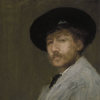James Whistler

James Whistler
James Abbott McNeill Whistlerwas an American artist, active during the American Gilded Age and based primarily in the United Kingdom. He was averse to sentimentality and moral allusion in painting, and was a leading proponent of the credo "art for art's sake". His famous signature for his paintings was in the shape of a stylized butterfly possessing a long stinger for a tail. The symbol was apt, for it combined both aspects of his personality—his art was characterized by a...
NationalityAmerican
ProfessionPainter
Date of Birth11 July 1834
CountryUnited States of America
Can't a person be born where they want to be born?
A picture is finished when all trace of the means used to bring about the end has disappeared.
Frederic Leighton to James McNeill Whistler: 'My dear Whistler, you leave your pictures in such a sketchy, unfinished state. Why don't you ever finish them?' James McNeill Whistler to Frederic Leighton: 'My dear Leighton, why do you ever begin yours?
Over and over again did the Attorney-General cry out aloud, in the agony of his cause, 'What is to become of painting if the critics withhold their lash?
Truly color is vice! Of course, it can be, and has the right to be one of the finest virtues. Controlled by the strong hand and careful guidance of her Master drawing, color is a splendid Mistress, with a mate worthy of herself, her lover, but her Master likewise, the most magnificent Mistress possible, and the result is evident in all the glorious things that spring from their union.
Paint should not be applied thick. It should be like a breath on the surface of a pane of glass.
Mauve is just pink trying to be purple.
The masterpiece should appear as the flower to the painter - perfect in its bud as in its bloom - with no reason to explain its presence - no mission to fulfill - a joy to the artist, a delusion to the philanthropist - a puzzle to the botanist - an accident of sentiment and alliteration to the literary man.
People will forgive anything but beauty and talent. So I am doubly unpardonable.
The explanation is quite simple. I wished to be near my mother.
The work of a master reeks not of the sweat of the brow - suggests no effort - and is finished from its beginning.
A student of James McNeill Whistler tells the great artist, 'I tend to paint what I see.' Whistler replies, 'Ah! The shock will come when you see what you paint!
Industry in art is a necessity - not a virtue - and any evidence of the same, in the production, is a blemish, not a quality; a proof, not of achievement, but of absolutely insufficient work, for work alone will efface the footsteps of work.
Nature is very rarely right, to such an extent even, that it might almost be said that nature is usually wrong...